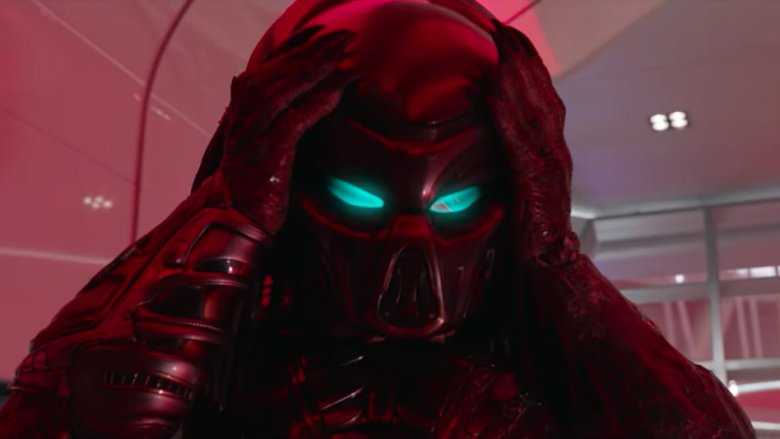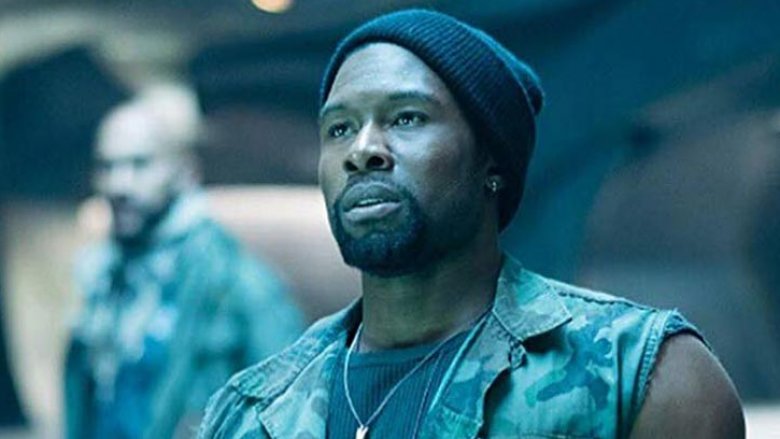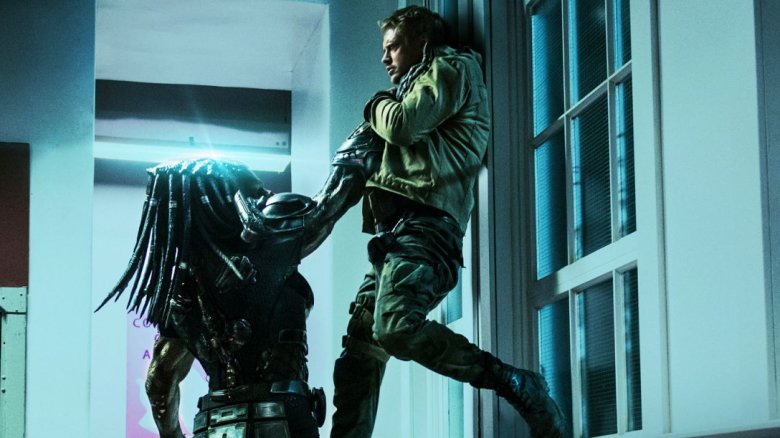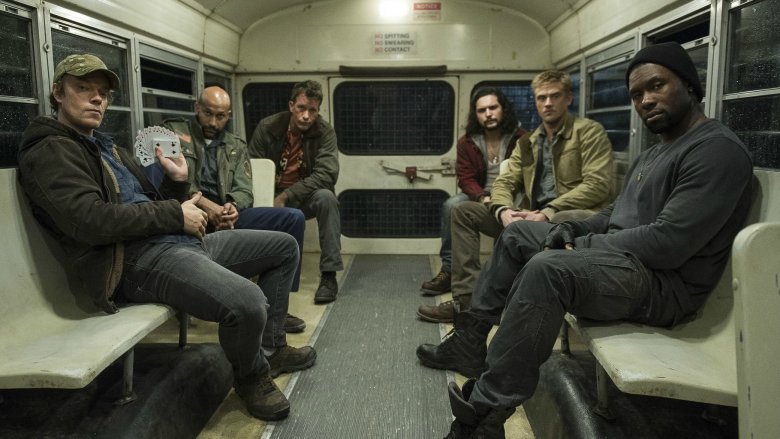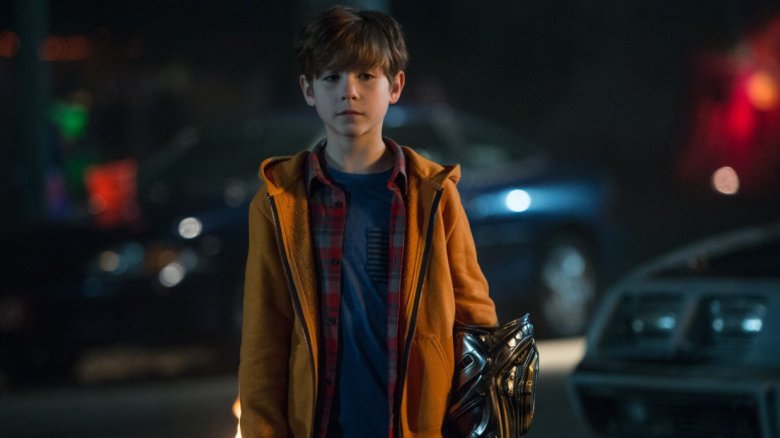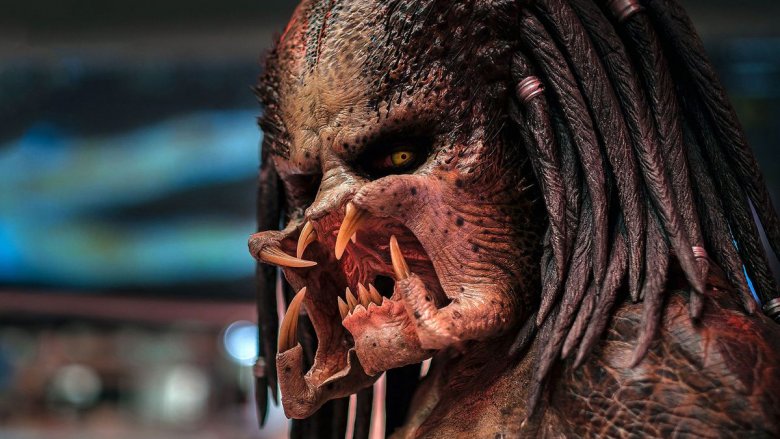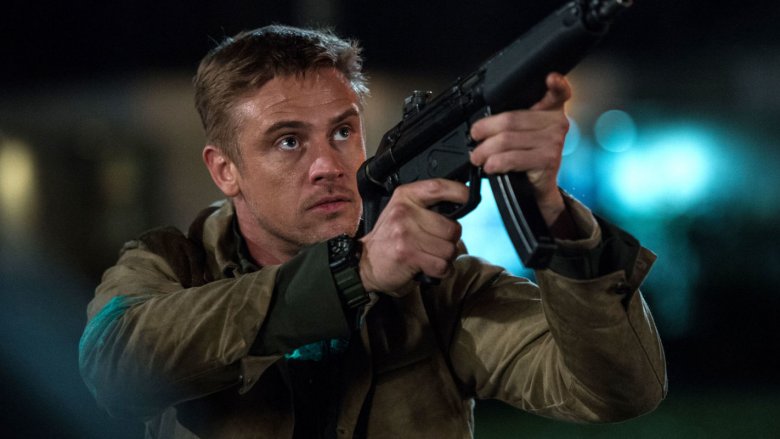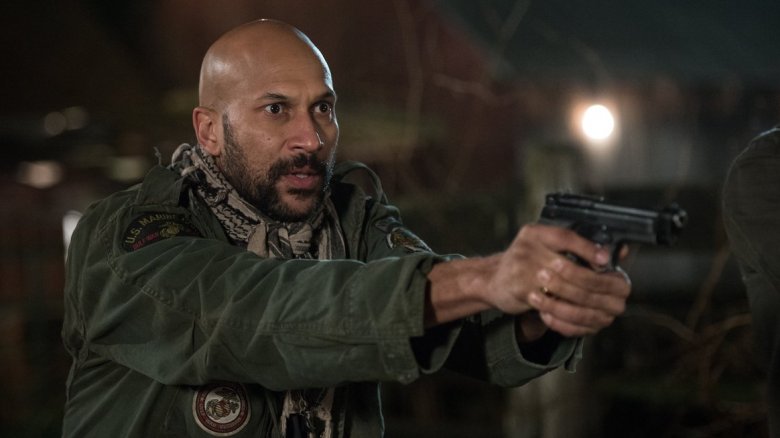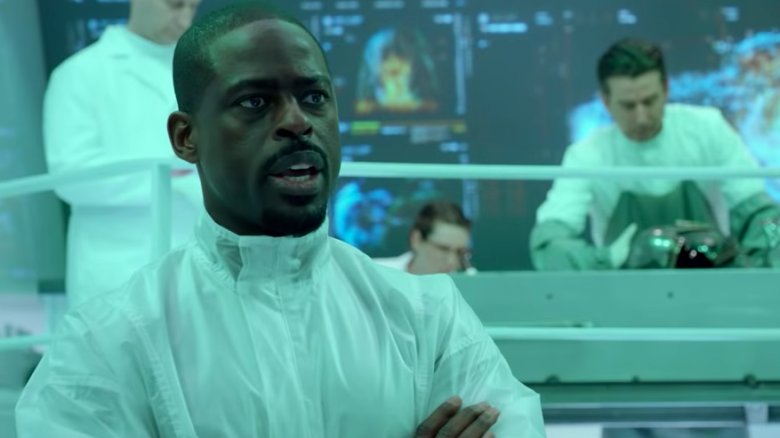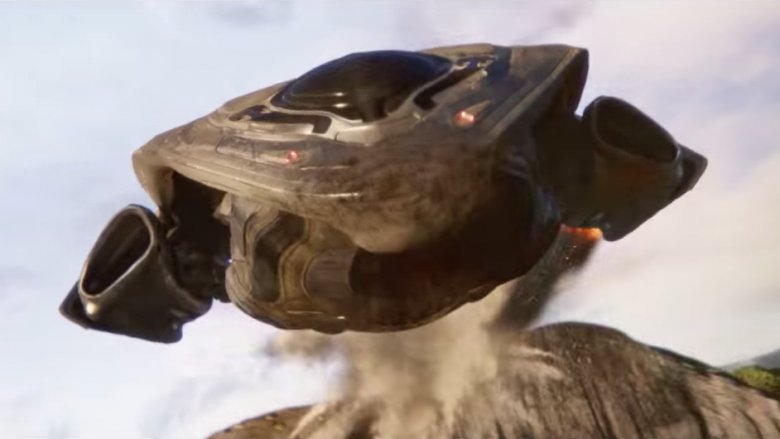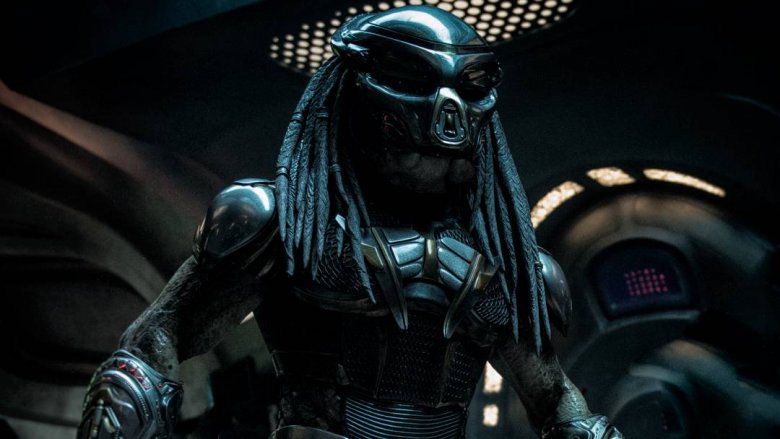5 Best And 5 Worst Things About The Predator
While its sequels have varied in quality, Predator is an action classic that proves with a solid enough concept — like, say, an alien terrorizing a gang of mercenaries in the jungle — any installment in a franchise is worth checking out. The Predator is one of the great movie monsters, and seeing what new directors do with the saga is always interesting. With The Predator, series vet Shane Black — who had a small but memorable role in the original — returns as director and co-writer to put a fresh stamp on the series.
As reviews have indicated, Black's The Predator might be built from that sturdy old Predator DNA, but it's very much a mixed bag. There's a lot to like, including a stellar cast, but plenty of untapped potential too. With that in mind, we're gearing up for a little action thriller autopsy and taking a look at the five best — and five worst — things about The Predator.
Best: Trevante Rhodes nails it
The Predator's ensemble cast is an undeniable highlight, and Trevante Rhodes — recently seen in Best Picture Oscar winner Moonlight — is a particular standout. Rhodes absolutely shines, turning out a memorable and affecting performance that may be the most resonant aspect of the film.
Rhodes plays Nebraska Williams, a soldier who survived a suicide attempt. There's a weary charm to his take on the character, one that feels human and vulnerable in ways action roles often don't. He also elevates the performance of Boyd Holbrook, who's never better than when the two share the screen and form a bond between two traumatized men of war. His eventual death, the most gutting moment in the film, is allowed the emotional space to leave an impact. The future looks bright as ever for Rhodes, who's now proved that he can bring just as much nuance to a blockbuster action role as he can to an intimate arthouse drama.
Worst: Reshoot Mania
Studio-mandated reshoots are ostensibly done in the interest of making a film a better version of itself, but they often compromise the project's integrity and make it feel like a disjointed mess. It's pretty clear from the first time you watch The Predator that this is a problem.
There are two movies inside The Predator. One is a sci-fi thriller about government conspiracies, evolution, and (kind of) global warming. The other is a lean action film heavy on comedy and character work. The films don't work well together, and it's very obvious which came from the studio and which came from Black. It's a shame, as Black's film feels more vibrant and unique. That it's marred by interference, especially in its third act, and weird attempts at franchise-building makes it hard not to wish the studio had trusted him with the story he wanted to tell.
Best: The Shane Black of it all
Writer/director Shane Black makes a very particular kind of movie. His films are often action-comedies with gratuitous (but often hysterical) violence. Quippy dialogue is key. He's also great at taking minor henchman characters like hitmen, mob flunkies, and sidekicks and making them stand out with idiosyncratic dialogue and tics. The moments in which he brings this ethic to The Predator are the ones in which the film really shines.
The film is never better than the scenes in which actors are simply talking. Black's snappy dialogue is funny and smart, but also always utilized in ways that reveal character or make exposition more palatable. The standout sequence of the entire film is a simple scene in which Holbrook's Quinn McKenna and his crew are in a cheap motel room waiting for Olivia Wilde's character to regain consciousness after a hit from a tranquilizer dart. The jokes fly left and right as the scene gives the film room to breathe and its characters a moment to grow and reveal themselves. The film isn't always permitted to be the movie it wants to be, but when it is, it feels special.
Worst: It's downright offensive
There's bad and there's offensive, and unfortunately The Predator has the latter as well as the former. Nothing hinders it quite so heavily as the way it depicts mental disorders. Nebraska Williams may be the only character that escapes this inability to portray them unscarred. The rest of the cast is liberally sprinkled with mental afflictions written in a way that displays a lack of understanding or, perhaps more importantly, empathy.
Thomas Jane's character is introduced as having Tourette syndrome, a disorder that, despite what pop culture may have led you to believe, only causes the afflicted to spew random streams of immature (but generally coherent) curses and slurs in 10-15% of cases. Nobody seems to have told Black; Jane's character is written as a one-note stereotype whose Tourette's is used as fodder for jokes. Far worse is Jacob Tremblay's Rory, who's introduced as having autism — but Black's understanding of autism seems to begin and end with watching a highlight reel from Rain Man. In this cinematic universe, autism is shorthand for "bad at socializing and good at deciphering alien languages," and an entire plot point revolves around the psuedo-scientific claim that the disorder is the next step in human evolution. It's astoundingly offensive, and the kind of thing that should have been cut after the first draft of the script.
Best: Keep it practical
It would have been very easy to just hire a good CGI unit to create a digital Predator for the film, but Black doesn't take the easy way out in The Predator. The film features some CGI, yes, but most sequences featuring the terrifying titular menace include an actor in a bodysuit and extensive makeup rather than a digitally composed character. It not only lends a great deal to the film's realism (the threat feels so much more physical when the effects are composed this way), but is an impressive feat in its own right — in fact, the intricate composition of the effects is often so impressive that it's hard not to sit back in awe at some points. The leaps and bounds in progress we've seen in the field since the first film was made are all onscreen here, and it's well worth taking a moment to appreciate while watching the movie.
Worst: Boyd Holbrook is bland
In 2017's Logan, Boyd Holbrook brought charismatic menace to a villainous role. None of that charisma is present in The Predator. It's almost shocking, because in order to lead a Predator movie, charisma is pretty much the only requirement. Arnold Schwarzenegger isn't exactly the best actor in the world, but he's still perfect as Dutch in the original. Holbrook, unfortunately, seems to sleepwalk through what could have been a compelling performance.
The role initially belonged to Benicio del Toro, who eventually had to drop out due to scheduling conflicts. In that light, Holbrook's casting make a bit more sense — he's a replacement, not the actor the role was written for. He's also significantly younger than del Toro, making for a character that never feels quite as world-weary or jaded as Quinn McKenna is supposed to seem. While Holbrook admittedly has some great chemistry with the Trevante Rhodes, his performance is easily the least interesting of the entire film. The problem is that the film doesn't seem to realize this.
Best: The crew runs deep
The original Predator features a great ensemble action cast. From leads Arnold Schwarzenegger and Carl Weathers to great supporting performances from Jesse Ventura and Black himself, it's an absolute murderer's row of talent playing the special ops crew called in to handle some shady business in the jungle. A Predator movie just doesn't feel right without a killer cast. Luckily, The Predator has one.
In fact, the film's cast is easily what works strongest in its favor. As mentioned, Rhodes is a particular standout, but there's a great chemistry between the rest of the crew. From Keegan Michael Key's rapport with Thomas Jane to Sterling K. Brown's wonderful menace as the film's human antagonist, the interplay between the actors lends an authenticity to their performances. It also just makes the movie more fun to watch. It seems like everyone involved is having a good time (for the most part) and that energy is infectious when it's present.
Worst: It's complicated
The first Predator film is remarkably lean: a group of mercenaries are trapped in the jungle and hunted by an alien force. That's it. The characters' motivations are simple — survive — and it makes the fact that The Predator is anything but simple all the more frustrating.
Prey being hunted by Predators is pretty much all you need to guarantee these movies are great, so why is there so much superfluous content here? There are bizarre subplots involving government agencies, warring Predator factions, evolution, and global warming, none of which are particularly fleshed out or relevant to the franchise's appeal. That they're given so much screen time not only slows the pace of the film's admittedly solid action, but muddles the plot. We don't love Predator films for their take on evolutionary biology and expansive science fiction storytelling. We love them because watching killer alien fights is a good time. Whoever takes the reins of the franchise from here should keep that in mind.
Best: A valiant effort
We live in a franchise-driven, cinematic universe era. Every existing property from superheroes to old Hasbro toys is being picked and prodded at in an effort to find the next MCU, with every studio utilizing the same played-out tactics that simply don't work the way they want them to. The Predator easily could have been two self-serious hours of bland studio filmmaking, and it's to its credit that it isn't — but it also suffers from aggressive attempts at franchise-building that drag it down. At the same time, it really swings for the fences for a good chunk of its runtime.
Black was an actor in the original Predator, so it stands to reason that of all the filmmakers in Hollywood, he may better understand what makes these movies fun. You get the feeling watching the film that he's really trying to use the iconography of the Predator franchise to sneak a fun, heartfelt action romp with something to say into theaters. That effort shines through at times — and the fact that he made it at all is commendable.
Worst: It should have been great
The worst thing about The Predator, outside of its unflattering portrait of mental illness, is that it should have been a slam dunk. Black writing and directing a sequel to a film he starred in should have been something special — and its military components had the potential to zero in on the ways trauma affects the action hero archetypes the original Predator embraced, all while delivering some killer jokes and set pieces. The film held such promise, and it just doesn't deliver on enough of it.
Because it feels caught between the two different movies it's trying to be, the loss of the great one hidden underneath feels so much more palpable. We see snippets of the movie we could have been given in The Predator, and it only makes it more frustrating that we didn't get the whole thing. Wasted potential stings far more than a movie that never had any chance of being any good — wasted potential, thy name is The Predator.
